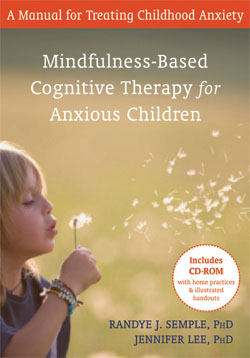First Edition: Mindfulness: an Rx for Anxious Children
Two TC alumnae fuse Buddhist and Western approaches
Two TC alumnae fuse Buddhist and Western approaches
By STEVEN KROLL
IN 2000, TWO TC DOCTORAL CANDIDATES, Randye J. Semple and Jennifer Lee, noticed that children in TC’s Dean-Hope Center were complaining of noise in their neighborhoods—gunshots, traffic, parties, fights. The children were anxious and nervous and were having problems in school. Semple and Lee, who were students of Lisa Miller, Professor of Psychology and Education, decided to conduct a clinical trial of mindfulness-based cognitive therapy (MBCT) with the children. The result of that work is both a new track in spirituality and contemplative practice (taught by Miller) within TC’s clinical psychology master’s degree program and a new book by Semple and Lee, Mindfulness-Based Cognitive Therapy for Anxious Children (New Harbinger Publications, Inc., 2011).
Long-term childhood anxiety can prefigure depression and anxiety in adolescence and adulthood. MBCT may seem paradoxical, in that it fuses Buddhist meditative practices, which, as Semple and Lee write, promote “accepting things as they are,” with traditional Western cognitive therapy, which promotes “changing things we don’t like.” Yet the authors examine how these “curious bedfellows,” which both seek “to reduce human suffering,” might complement one another as strategies for helping children ages 9 to 12. Their book, which comes with a CD and illustrated handouts, outlines a 12-week program that is also intended to help practicing therapists awaken their own spiritual awareness.
Practicing mindfulness means to remain in the present moment, focusing on awareness of thoughts and feelings and resisting distraction from the constant influx of stimuli that besiege us in our daily lives. One method Semple and Lee suggest for practicing mindfulness is simply to take three deep breaths and focus on nothing else for that moment. Performed daily, this short exercise can expand into deep meditation. The result can be profound: Semple and Lee report that the kids in their clinical trial concentrated better and paid closer attention to their schoolwork.
Semple is Assistant Professor in the Department of Psychiatry and Behavioral Sciences at the University of Southern California. Lee is a clinical psychologist practicing privately and at the Children’s Home of Poughkeepsie, a residential treatment center. She holds an adjunct faculty position at Marist College.
Published Thursday, Dec. 15, 2011
